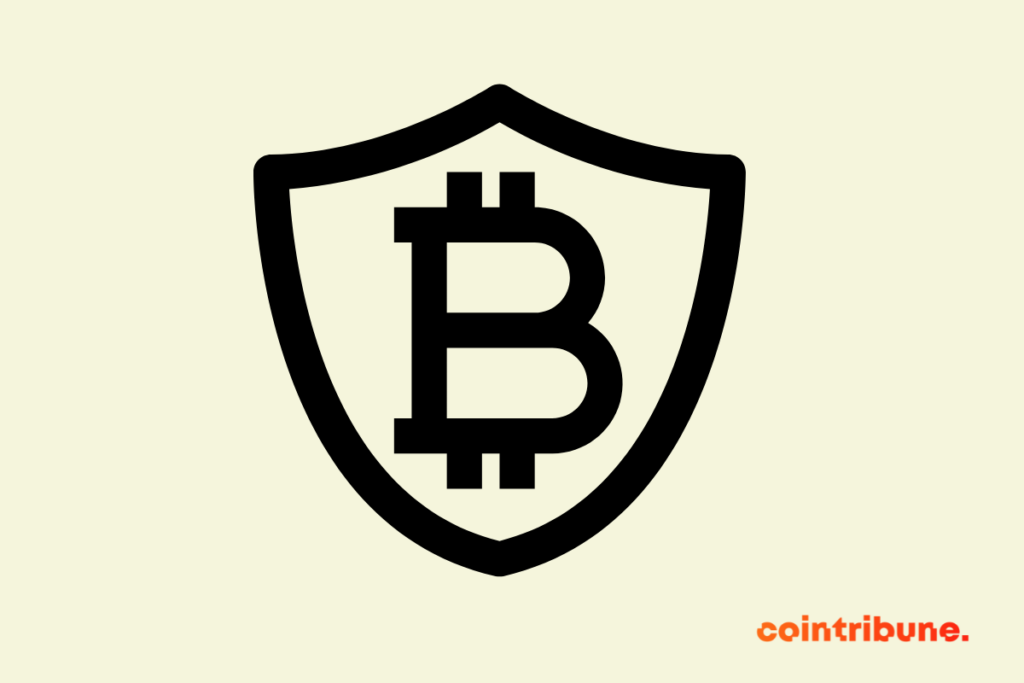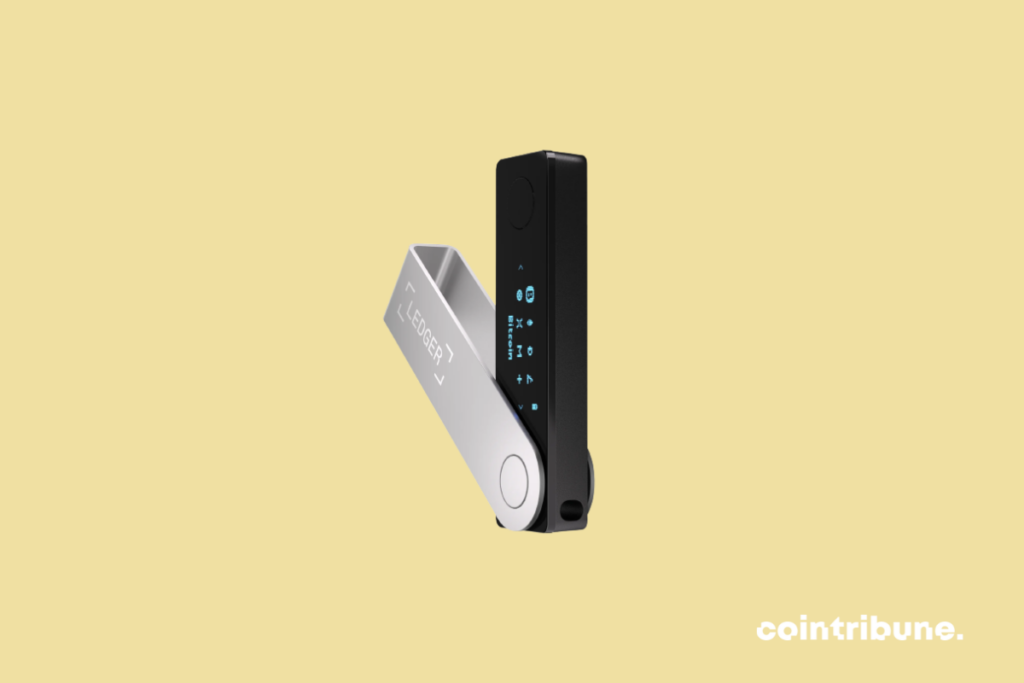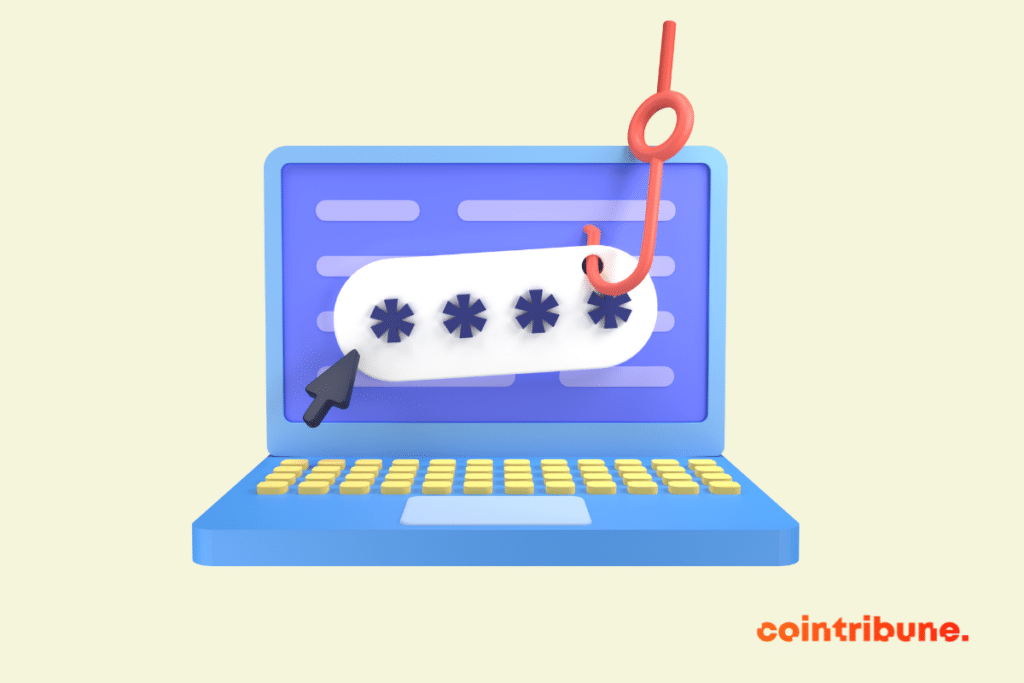Bitcoin Security: The Ultimate Guide
Whether you are a beginner in the crypto universe or not, you must know and master all aspects of Bitcoin security, as cybercrime is a growing scourge in this field. Protecting your digital assets is, moreover, entirely your responsibility, as even the most secure crypto platforms and exchanges can be hacked. In this article, we will explore in depth the security surrounding Bitcoin. We will cover the basics of crypto security, the different types of wallets available, the protection of private keys, and the potential threats you need to be aware of.

The basics of Bitcoin security
Understanding the fundamentals of Bitcoin security is essential to ensure the protection of your digital assets. In this section, we will examine how Bitcoin addresses work, transactions, and the associated fees, as well as the blockchain and confirmations.
Bitcoin addresses
A Bitcoin address is a unique identifier made up of 26 to 35 alphanumeric characters. It works like a bank account and allows you to receive, store, and send bitcoins. Bitcoin addresses are generated from public and private keys. Always keep your private key secret, as it allows access to and spending of the digital assets associated with your address. If a hacker or malicious person discovers the private access to your crypto wallets, they are capable of draining all your assets.
Transactions and associated fees
A transaction is the process of sending bitcoins from one address to another. Transactions are recorded and verified by the Bitcoin network through a process called mining. Miners are rewarded with transaction fees paid by the sender. These fees vary based on the size of the transaction and the level of network congestion.
The blockchain and confirmations
The blockchain is a revolutionary technology used for the secure storage and transmission of information. It works like a chain of interconnected blocks, where each block contains a set of transactions verified and validated by miners.
In the specific context of the Bitcoin network, the blockchain is the decentralized public ledger that records all transactions made with this cryptocurrency. Each block contains a group of recent transactions that have been validated by the miners.
Confirmations refer to the number of blocks added to the blockchain after the one containing a specific transaction. When a transaction is included in a block, it is said to be confirmed. The more confirmations there are, the more secure the transaction is considered. This is because each new block added to the blockchain requires considerable computing power to be validated, making it practically impossible to alter previous transactions.
Secure wallets
The choice of a bitcoin wallet is essential to protect your assets. In this section, we will introduce you to hardware wallets, software wallets, and paper wallets, as well as how to choose the best wallet according to your needs.
Hardware wallets
Hardware wallets are physical devices specifically designed to securely store your private keys offline, making them much more resistant to online attacks. Among the most popular examples are Ledger Nano and Trezor.
Using this storage technology provides you with a high level of security by allowing transaction signing without exposing your private key to a vulnerable online environment. This means that even if your computer or connected device is compromised, the private key remains secure on the hardware wallet, out of reach of hackers.
Additionally, hardware wallets usually come with extra protection mechanisms such as screens and physical buttons to validate transactions, which adds an additional layer of security by preventing phishing attacks or malware from hijacking sensitive information.
By using a hardware wallet, you will benefit from a secure and reliable storage solution for your private key, which is essential in the cryptocurrency world where protecting digital assets is paramount.

Software wallets
Software wallets are applications installed on a computer, smartphone, or tablet. They store private access codes in the cloud, which makes them more vulnerable to online attacks compared to hardware wallets. However, software wallets provide a good level of security when used correctly. Popular examples include Bitcoin Core, Electrum, and Mycelium.
Paper wallets
Paper wallets are printed documents containing public and private keys in the form of QR codes. They are considered cold wallets because the keys are stored offline. These models offer a high level of security when properly generated, printed, and stored. However, their use may be less convenient than hardware or software wallets.
Comparison and choice of the right wallet
Choosing the ideal wallet depends on your needs and risk tolerance. Hardware wallets offer the highest level of security but can be expensive. Software versions are usually free and easy to use but carry a higher risk of online attacks. Paper wallets are very secure but may be less convenient for everyday use. Assess your needs, the amount you wish to store, and convenience to choose the one that suits you best.
Protection of private keys
The protection of private keys is essential to ensure the security of your bitcoins. In this section, you will learn more about the generation of private keys. We will also provide you with some key management tips for their secure storage, backup, and recovery.
Generation of secure private keys
Generating secure private keys is crucial to protect your digital assets. Use reputable wallets and avoid dedicated online generators. Ensure that the device is secure and up to date before generating your access codes.
Secure storage of private keys
Secure storage of private keys is essential to prevent bitcoin theft. Secure storage options include hardware wallets, paper wallets, and software wallets with encryption. Keep your private access codes in a safe place, away from prying eyes.
Backup and recovery of private keys
Backing up your keys is important to prevent loss of your bitcoins in case of hardware failure or accident. Create backup copies of your private keys and store them in safe and separate locations. Also, remember to back up your seed phrase, a series of 12 or 24 words that allow you to access your crypto wallet again in case of loss.
What are the threats and how to avoid them?
In the vast universe of Bitcoin, threats are omnipresent and varied. Phishing attacks and Ponzi schemes are the main Bitcoin scams that you may encounter. It is therefore imperative to familiarize yourself with these risks in order to anticipate and avoid them, thus ensuring the security of your transactions and investments.
Phishing attacks
The phishing attacks aim to deceive users into revealing their personal information, such as private keys or passwords. To avoid phishing attacks, always check the URL of websites, do not click on suspicious links, and do not open questionable attachments.
Even if you receive an email that seems to come from the exchange on which you are registered, in which the sender asks you to click on a link, make sure that it has signed the email with the platform’s PGP key. The PGP key (Pretty Good Privacy) is an encryption solution that secures email exchanges.
This signature cannot be reproduced, as it contains a pair of keys: public and private. Without the private key, no hacker can impersonate a player in the crypto ecosystem to deceive users.

Scams and frauds
Scams and frauds are common in the cryptocurrency world. They can take various forms, such as fake investments, fake exchanges, and fake wallets. To avoid falling into these traps, always conduct thorough research, use reputable platforms and services, and never share your personal information with strangers or even with your loved ones.
Malicious software (malware)
Malicious software is programs that can steal your personal information, including your private access codes. To avoid malware, ensure that your operating system and antivirus are up to date, do not download software from untrusted sources, and exercise caution when browsing the internet.
Tips to avoid threats
In summary, to avoid threats related to Bitcoin security, follow these tips:
- use secure wallets,
- protect your private keys,
- be vigilant against phishing attacks, scams, and malware,
- conduct thorough research before using platforms or services.
Conclusion
Knowing the basics of Bitcoin security is essential when you want to take your first steps in the crypto industry. This ecosystem operates under specific rules that are different from what you have known so far. To have a positive experience and protect your investments, you must master the various security threats that you may encounter as soon as you open your wallet and purchase your digital assets. Therefore, use the solutions presented in this article to protect yourself from phishing attacks, scams, and malware.
Maximize your Cointribune experience with our "Read to Earn" program! For every article you read, earn points and access exclusive rewards. Sign up now and start earning benefits.
The Cointribune editorial team unites its voices to address topics related to cryptocurrencies, investment, the metaverse, and NFTs, while striving to answer your questions as best as possible.
The views, thoughts, and opinions expressed in this article belong solely to the author, and should not be taken as investment advice. Do your own research before taking any investment decisions.